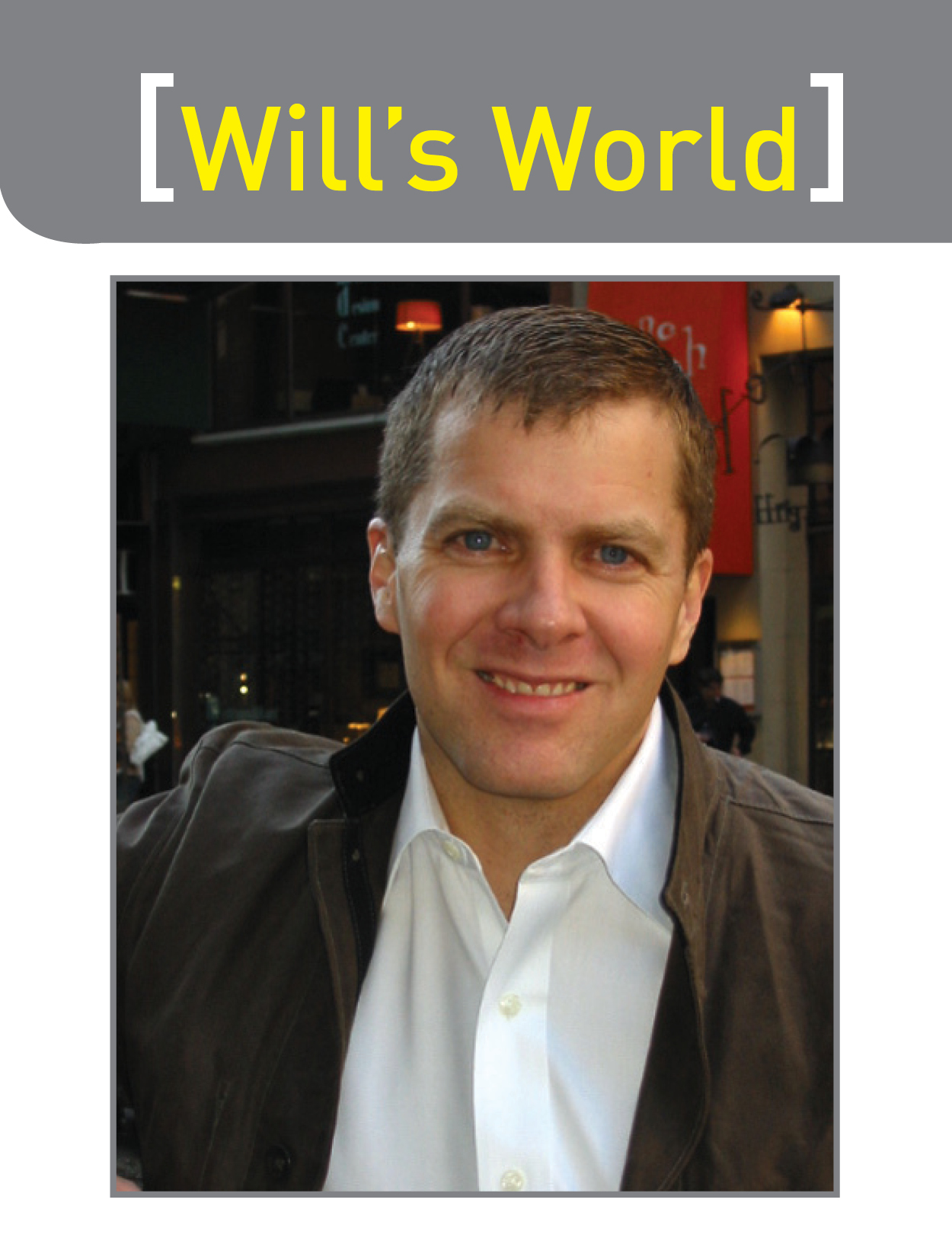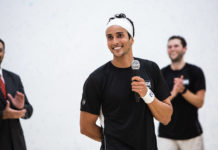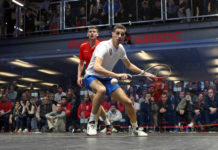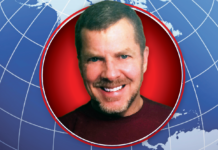By Will Carlin
Amr Shabana was walking away from me. The Maestro, as he is called by PSA Squash TV commentators Joey Barrington and Paul Johnson, had just won the semifinals of the 2014 Tournament of Champions, and I was supposed to jump on court and interview him after his win over James Willstrop, but he was too quick and he was already off court and walking toward his support team.
I called his name, but he didn’t look back. I could feel my face flush, as I realized I had broken one of the tenets of being a good tournament host: never let the players get away from you.
For two years, I had been interviewing players after their matches on the glass court in Grand Central Terminal, and for that role, I had been learning the tricks of the trade from the tournament’s own maestro, Don Goodwin, the ToC’s longtime Master of Ceremonies.
Don had taught me both the rudiments of the job (“You have to really watch their mouths when the players speak and imagine that there is a string from their nose to the microphone and you can’t let the string get too tight”) to nuances (“Always have a mint or chew some gum just before interviewing them—they might not notice if you have bad breath, but why take the chance?”), and after the finals the next day, his time with the tournament would be coming to an end.
“Why are you stopping now?” I asked him as the tournament got started. “It’s time,” he said. “And I have stopped enjoying leaving Florida in the winter. It is too cold up here.”
That was a funny comment, for Don is a native Canadian and he was a newscaster and sports commentator for many years in the much-colder-than- NYC north. In fact, he both served in the Canadian Army (“Yes, we really wore kilts”) and later was Chef de Mission for the Canadian Olympic team in the 1976 Innsbruck winter Olympics. In other words, he has never been a stranger to cold.
But after a long career that has included being the Head of Sports for the Canadian Broadcast Corporation, including for the Olympic Games (the Bob Costas of Canada) and later the CBC’s main television news host across the continent (the Dan Rather of Canada), not to mention the venue Master of Ceremonies for dozens of tennis tournaments across the globe, he decided that he has done enough travel for any one person, and he wanted both to spend time with Rosemary, his wife of thirty years and, well, to be warm.
I was more than warm at the moment, but Amr was escaping. One of the ushers in front of Amr saw what was going on and gently guided him to turn around. I was saved. Amr came back on court for a post-match interview.
Amr was clearly pleased, but also subdued, as I chatted with him about his win. This reaction contrasted with his quarterfinal five-game win over Nick Matthew, where, after the final point, he ran to the front wall and ran onto the wall, seemingly taking a number of steps up it in celebration.
His celebration was a long time in coming for the past few years have been both injury- and sickness-filled. “I had a tough few years with injury and every time you get injured you don’t know if you’ll be back again. I’ve had moments when I’ve thought that would be it for me, but luckily, I’ve kept my head down and I’m ok for now.”
He was more than okay the next day in the finals, where he played one of his closest friends on tour, Gregory Gaultier. Their friendship may have played a part in a final that promised much in terms of competitiveness, but was one-sided as Amr demonstrated his mastery not only of his racquet but also of his own emotions.
When I went on court to interview him after the match (“Don’t let him get away this time,” said Don just before I went on court), the first thing he did was to congratulate Gregory on his tournament and deflected his own great play by saying that Gaultier was injured and clearly not playing as well as he normally does.
Later, he mentioned that with a healthy body for the first time in a long time, he had recommitted to training and was determined to play better. It came more quickly than he had hoped.
“Everything came together for me this week. You can do all the training you want but you still need things to go your way and that’s what happened for me this week so I’m going to remember it for a long time.”
After my interview, I made my way off the court, passing off the microphone to Goodwin, who presided over the award ceremonies and was recognized by Tournament Chairman, John Nimick, for his long service. Goodwin got a standing ovation and was momentarily choked up.
It passed as quickly as one of Shabana’s volley drops, and Goodwin got back to the ceremony.
One couldn’t help notice that Goodwin’s last duty as the tournament’s Ceremony Master was to congratulate a newly resurgent player whose own longtime outstanding play earned him the analogous nickname.
Master congratulating Maestro. Perfect.





